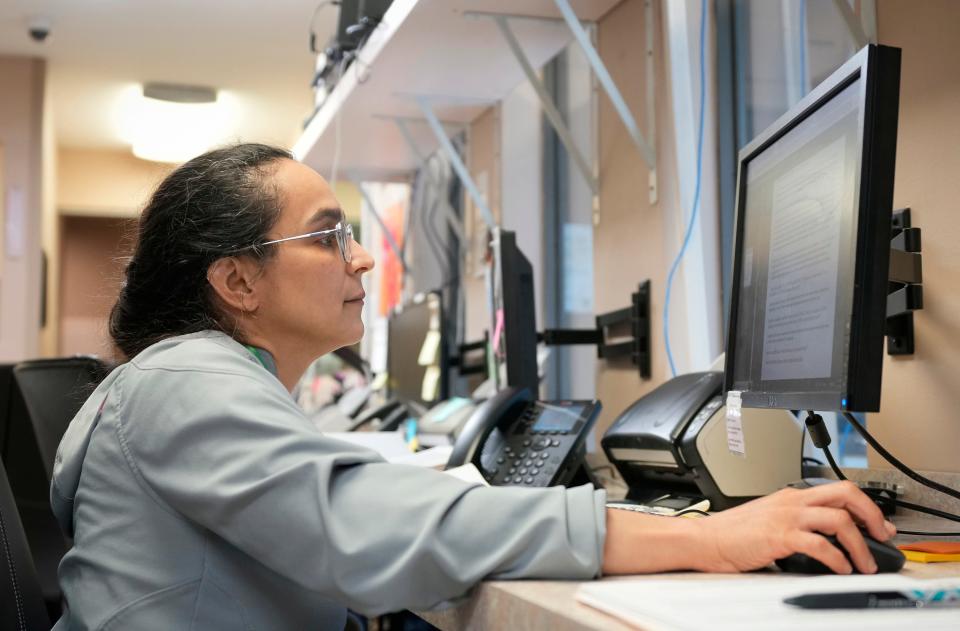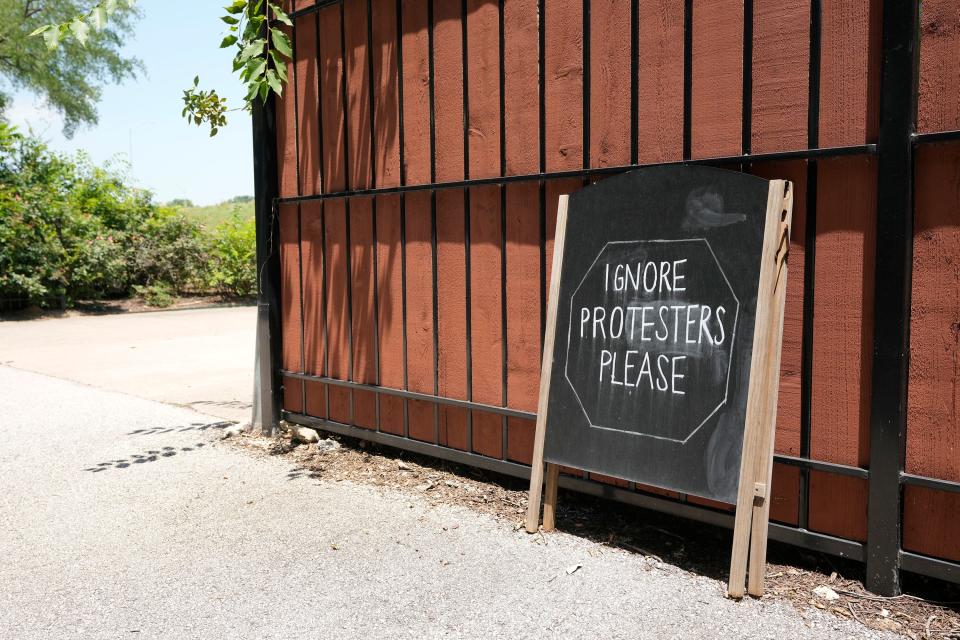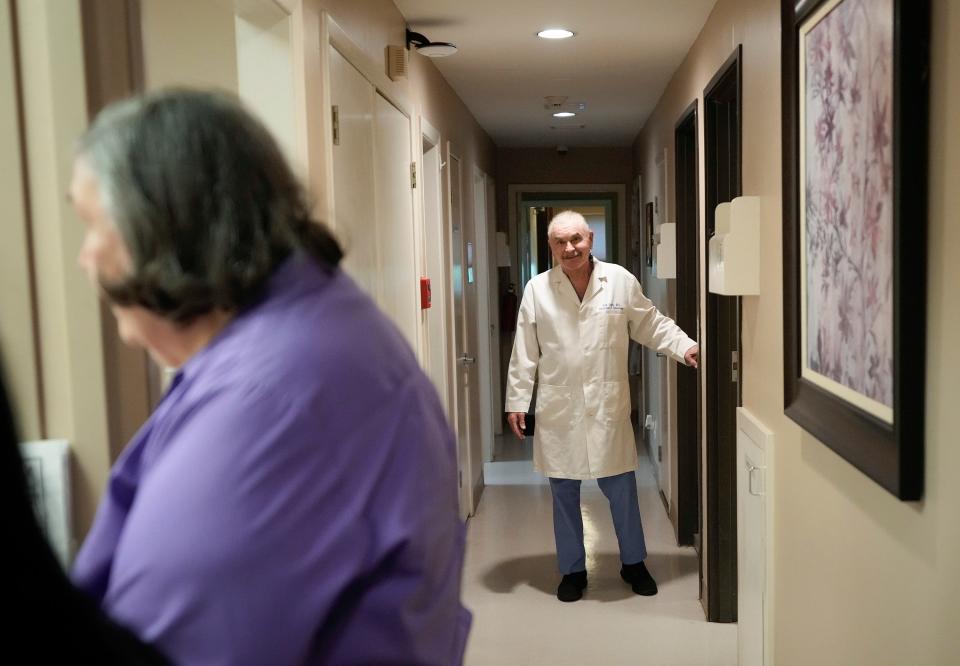Abortion clinics reinvented themselves after Dobbs. They're still struggling
AUSTIN, Texas – There was a time when the Austin Women's Health Center would be so full, patients waited outside on benches.
Those lucky enough to get a seat inside watched carefully chosen movies on the waiting room television. Nothing with violence − the clinic faced enough threats. Nothing featuring food, either, since some patients had to come with an empty stomach.
Those days are gone. Nearly two years after the U.S. Supreme Court ended the nation's constitutional right to an abortion, the waiting room was quiet. On a humid day in late May, just one or two patients waited to see the clinic's nurse practitioner. The television was off.
The small counseling rooms where patients once sat with Maria Yarborough before their abortion and the row of massage chairs they recovered in afterward were empty. Prior to the court decision, Yarborough said, the staff came to work every day knowing they were going to make a difference in their patients' lives, but "the purpose of our job has been taken from us."

Austin Women’s Health Center is one of many former abortion clinics struggling to keep its doors open since the Supreme Court delivered its watershed decision in Dobbs v. Jackson Women's Health Organization on June 24, 2022.
Dozens of abortion clinics closed permanently or relocated out of states that banned the procedure, worsening access to both abortion and other forms of reproductive health care nationwide. Those that remain are often independent operations fighting to stay open.
The Austin clinic, which opened in 1976, just a few years after the Roe v. Wade decision made abortion legal nationwide, saw it's finances tank in the wake of its reversal. With reduced services and hours, it lost money month after month and did not break even until January.
For medical director Dr. L.L. “Tad” Davis, the financial hit has been personal. He owns the building, but he is not charging rent. He has not taken a salary in more than a year.
“It's been a difficult, difficult time as we try to reinvent ourselves,” he said.
More than half of the staff is gone. Many were laid off in June 2023 when Davis could no longer afford to pay them.
But the office is filled with reminders of their former colleagues. Their coffee cups still hang in the tiny kitchen beside Yarborough’s sunset-colored mug, their handmade origami figures and Post-it note sketches line shelves stacked with paperwork, their empty lockers are still decorated.
Under state law, the skeleton crew cannot perform another abortion. But they continue to provide their patients – often Black women and other minorities struggling to make ends meet – other forms of reproductive health care: birth control, managing miscarriages, testing for sexually transmitted infections.
On top of treating everything from “colds to hemorrhoids to Type 2 diabetes," the close-knit staff have taken on a slew of new responsibilities, according to nurse practitioner Ginger Ridout, who has worked at the clinic for 17 years. Yarborough, who started as the clinic's medical receptionist in 2016, oversees the clinic’s daily operations and assists with patients. She also cleans the office since janitorial services were cut.
“We are multitasking like you cannot believe,” said Ridout, a nurse practitioner for more than 40 years.

Why independent clinics are so important post-Dobbs
Yarborough calls the clinic in Austin, also known as the Brookside Women’s Medical Center, a "little treehouse." It's tucked away off a busy highway beneath a lush canopy of pecan trees. Sometimes patients have a hard time finding the office, but the small team directs them to the right bus line or walking route.
That intimate knowledge of the area is one advantage an independent clinic has over a national organization like Planned Parenthood, she said, which has clinics all over the state but takes calls at a center in Dallas.

And unlike Planned Parenthood, the clinic provides post-abortion medical care nearly impossible to get anywhere else in Texas, according to Davis. He considered moving the clinic out of state, but felt there was a greater need to serve Texans who had complications after having a medical or surgical abortions elsewhere, as well as those who had nonviable pregnancies.
“There's no place for them to go in the state of Texas for complete care, except our office,” he said. “And Texas is a big place.”
At least 65 independent clinics have closed completely or stopped providing abortion care since 2022, the Abortion Care Network report found in a 2023 report. The decline is likely to continue following the implementation of a six-week ban in Florida and the potential enforcement of a near-total ban in Arizona, according to the Guttmacher Institute.
“There's not enough health care centers,” said Erin Grant, co-executive director of the Abortion Care Network. “But it's financially impossible to fight the state, stay open for your patients and pay (staff) and give high quality care.”
The loss of independent abortion clinics, also called “indies,” is particularly damaging because they often provide multiple types of health care ranging from midwifery and fertility services to gender-affirming care, all of which are under threat, Grant said. Relocating to continue providing abortion services is not only an enormous logistical undertaking for an indie clinic, but also often an ethical dilemma for providers “knowing that their expertise in reproductive health care, that void won’t be filled.”
“What makes independent abortion providers so important in the wake of the loss of Roe is that indies are really committed to their communities,” they said. “They don't want to leave those communities.”
Communities need clinics 'now more than ever'
After the Dobbs decision came down, the owners of CHOICES Center for Reproductive Health in Memphis, Tennessee, opened a new abortion clinic in Carbondale, Illinois.
But the expansion didn't mean leaving Memphis. Given how many abortion clinics closed, staying in the city CHOICES has served since 1974 and making a fast pivot was a high priority, said president and CEO Jennifer Pepper.
“In places like Alabama, Tennessee, Mississippi, you can't afford to lose a health care provider like that,” she said. “There's just such a lack that the loss of even one or two really makes a difference.”

Since the Memphis clinic can no longer provide abortions under state law, Pepper said, her team is working to serve their patients in other ways, including providing midwifery in the city’s first and only birth center founded and run by Black midwives. The center, which aims to support 200 birthing families this year, primarily serves Black women in surrounding counties who are either uninsured or on public health insurance.
“That need hasn't changed since the Dobbs decision,” Pepper said. “In fact, the community certainly needs us to be providing those services, now more than ever.”
Other clinics have focused on providing care for the increasing number of patients who must travel out of state to get an abortion. The proportion of people traveling across state lines to obtain an abortion has doubled since 2020, to nearly 1 in 5 in the first half of 2023, according to a report from Guttmacher.
Houston Women’s Reproductive Services, 150 miles east of Austin Women’s Health Center, began providing care such as ultrasounds for women who have abortions outside the state, according to administrator Kathy Kleinfeld. To keep its doors open, staffing was cut from 12 to four. The clinic downsized from a 5,000-square-foot location to a space less than 800 square feet.
“Because of a drastic reduction in income we had to make changes in our expenses, of course,” Kleinfeld said.
The clinic considered adding new gynecological services, Kleinfeld said, but because it had only previously provided medication abortion, it didn’t seem feasible. Moving never felt like an option given the increased number of crisis pregnancy centers, which Kleinfeld said “often use scare tactics and false information” to discourage people from having an abortion.
“If we were no longer providing the services in Houston, we knew that the only options might be to go to a facility like that,” she said. “And we were not going to allow that to happen.”
Dobbs ‘destroyed the trust in medicine’
Robin Marty literally wrote the "Handbook for a Post-Roe America," but the reality has been worse than she imagined. Marty, executive director of the West Alabama Women’s Center, thought even if they could not perform abortions more clinics would stay open to provide other reproductive health care services.
But as facilities across the South shuttered, obstetricians and gynecologists changed plans to avoid practicing in states with abortion restrictions. Marty herself considered moving the clinic to Virginia or Illinois but couldn't do it.
“We can't relocate. There is no place for us to go,” she said. “Everything is gone around us.”
Marty’s Tuscaloosa, Alabama, clinic closed briefly after the Dobbs decision to mark the moment it stopped providing abortion services. It reopened shortly after as a nonprofit reproductive health care center, with a free and sliding scale fee, that provides prenatal care, contraception, and STI testing and treatment – which for some, Marty said, can be just as difficult to access as abortion.
Marty said the clinic can't direct women to out-of-state facilities to terminate their pregnancies for fear of criminal prosecution, a restriction health care providers are challenging in court.
“What people don't understand about Dobbs is that it hasn't just eliminated abortion access, it has eliminated any ability for doctors and patients to be able to trust each other from here on out,” she said. “And it in fact has kind of destroyed the trust in medicine.”
In the past two years, Marty said the clinic has served about 2,000 patients, the majority of whom are Black and either uninsured or on Medicaid. Cutting through red tape to provide care to patients that need it most has proved the biggest challenge.
Though the clinic successfully applied to be a Medicaid provider, Marty said the clinic is unable to get reimbursed for patients' prenatal care because doctors at surrounding hospitals will not agree to deliver their babies. The clinic carries the stigma of having been an abortion provider, she believes.
To stay financially afloat, the clinic relies primarily on small dollar donations, foundation grants and the growing number of patients with private insurance, Marty said. But she added, “Let's be frank, I dramatically lose money every month.”
“I'm concerned about everything all the time. I'm concerned about our clinics being open and what's going to happen if we can't do that,” she said. “We have about three months cash on hand and we're burning through that.”
Clinics face 'sharp increase' in violence, threats
The Abortion Care Network has doled out nearly $9 million to help keep independent clinics – including Marty's, Pepper's, Kleinfeld's and Yarborough's – open. But co-executive director Grant cautioned it's paltry compared to the financial need. They estimated the average cost of operating such a facility is about $1 million a year.
In addition to legal battles and operating costs, some of the money is spent on upgrading security because of an increase in “white supremacist violence and anti-abortion extremism,” Grant said. A report from the National Abortion Federation found a “sharp increase” in violence and disruption at clinics nationwide including arsons, burglaries, death threats and invasions in the year Roe v. Wade was overturned.

Yarborough said the Austin clinic still gets hate mail and groups of up to 30 or 40 protesters still occasionally gather in the parking lot, which is separated from the building by a natural spring creek.
Though scary for patients, once they make it inside she said the sound of highway traffic mostly drowns out their jeers and shouts. Yarborough is used to the noise, but she worries one day they protesters will find her on social media or worse, her home address.
The stigma around her job is so great she’s never told her parents, siblings and some of her friends what she does for a living.
“It’s about time they find out,” she said with a laugh.
Keeping the doors open

Finding money to keep the doors open at The Austin Women's Health Center is a constant struggle. The clinic raised nearly $40,000 through GoFundMe, which helped cover payroll for a time, but the fundraiser ended tens of thousands of dollars short of its goal, Yarborough said. Nurse practitioner Ridout even considered asking for help from a celebrity, such as actor and Texas native Matthew McConaughey.
“I found him one time, got his address, got everything online and thought, ‘I think I'll send him a letter,’” she said. “But I never did do that.”
The clinic continues to accept donations from the public through its website, but it has relied on funding from one of the state’s abortion funds, an organization which helps Texans pay for abortion care. Yarborough also is trying to turn the facility into a nonprofit and secure federal funding through a program known as Title X.
“It adds to our workload,” she said. “So when we have moments where we can work towards that we work towards it, and it isn't that often.”
For now, the clinic still can't afford a cleaning service. At the end of each week, Yarborough and another staff member stay for several more hours to deep clean each room, sanitize the instruments, take out the trash, fold the laundry and set the alarm.
She plans to return each Monday. Beyond that, she can’t say what the future holds for Austin Women's Health Center.
“I really hope we are here a year from now,” Yarborough said. “I really do.”
This article originally appeared on USA TODAY: Inside the fight to keep ex-abortion clinics open two years after Dobbs

